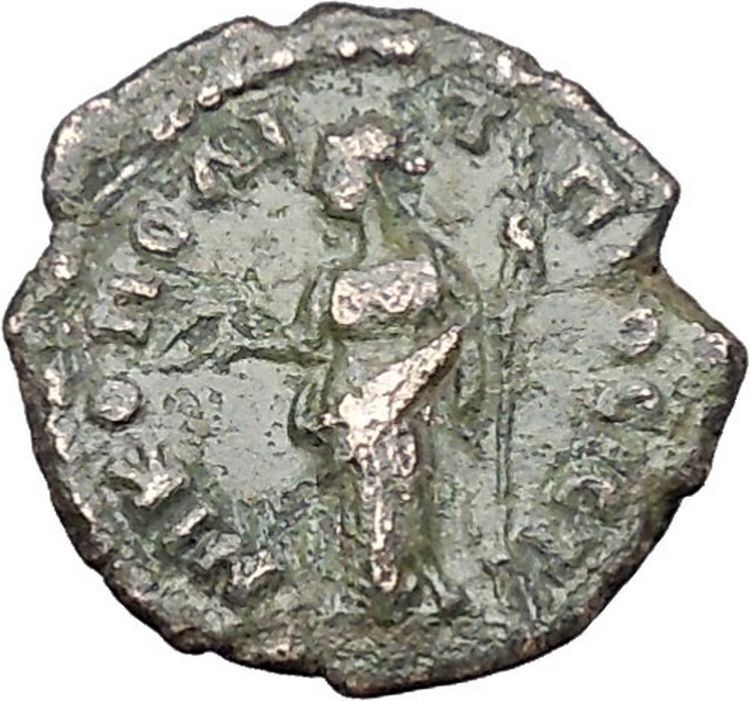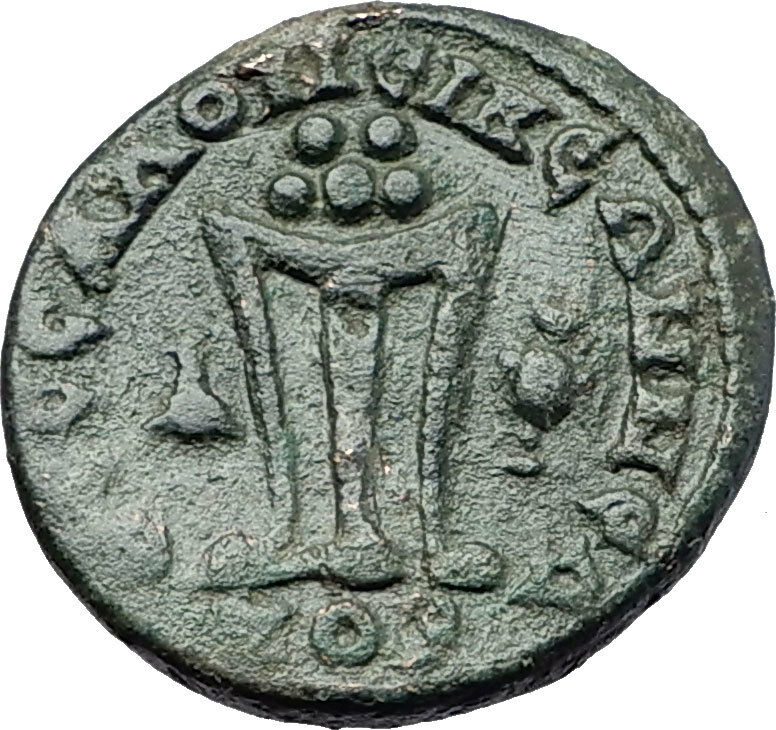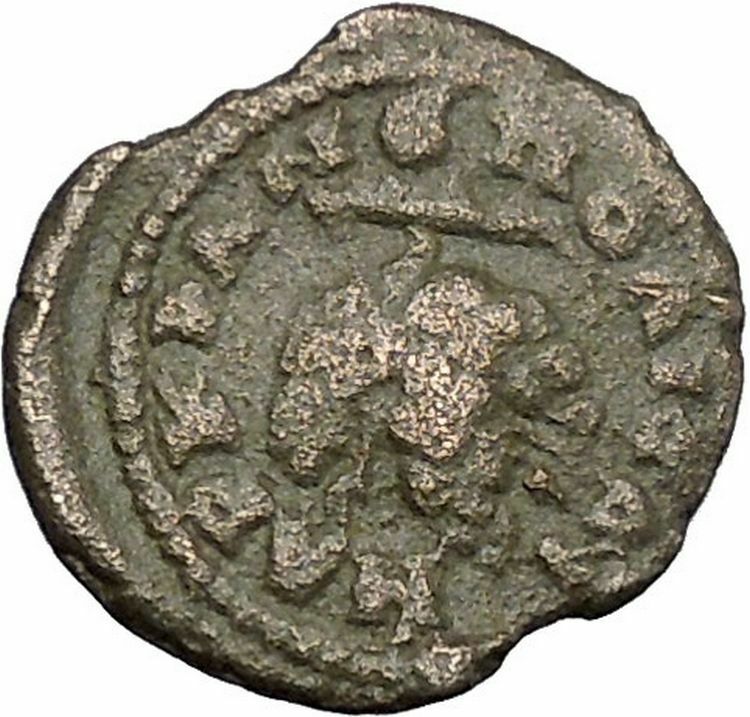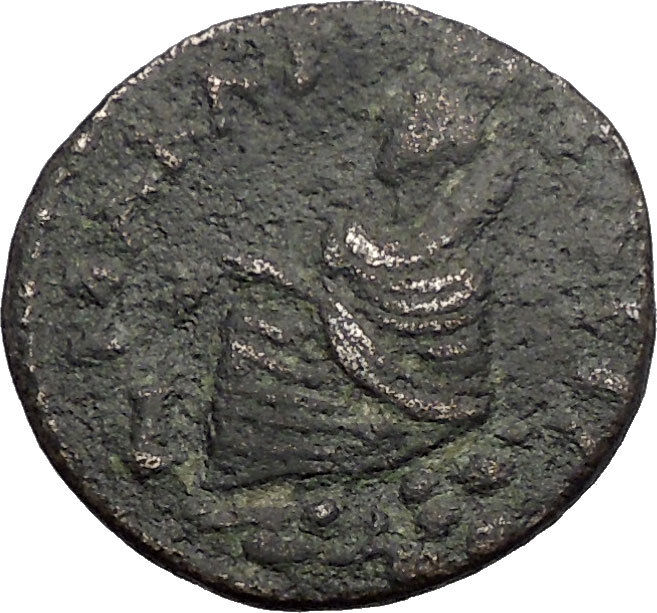|
Gordian III – Roman Emperor: 238-244 A.D. –
Bronze 26mm (7.56 grams) of Pella in Macedonia 238-244 A.D.
Reference: Moushmov 6488; Cohen 483; Mionnet 603
IMP C M ANT GORDIANVS, laureate, draped & cuirassed bust right.
COL IVL AVG PELLA, Tyche enthroned left, holding paterawearing turreted headdress.
You are bidding on the exact item pictured, provided with a Certificate of Authenticity and Lifetime Guarantee of Authenticity.
Tyche (pronounced Too-kee; Greek for luck; the Roman equivalent was Fortuna) was the presiding tutelary deity that governed the fortune and prosperity of a city, its destiny. Increasingly during the Hellenistic period, cities had their own specific iconic version of Tyche, wearing a mural crown (a crown like the walls of the city).
Pella (Greek: Πέλλα), an ancient city located in Pella Prefecture of Macedonia in Greece , was the capital of the ancient kingdom of Macedon . A common folk etymology is traditionally given for the name Pella, ascribing it to a form akin to the Doric Apella , originally meaning a ceremonial location where decisions were made. However, the local form of Greek was not Doric, and the word exactly matches standard Greek pélla “stone”, undoubtedly referring to a famous landmark from the time of its foundation.
History
The city was founded by Archelaus (413–399 BC) as the capital of his kingdom, replacing the older palace-city of Aigai (Vergina). After this, it was the seat of the king Philip II and of Alexander , his son. In 168 BC , it was sacked by the Romans , and its treasury transported to Rome. Later, the city was destroyed by an earthquake and eventually was rebuilt over its ruins. By 180 AD, Lucian could describe it in passing as “now insignificant, with very few inhabitants”.
Pella is first mentioned by Herodotus of Halicarnassus (VII, 123) in relation to Xerxes ‘ campaign and by Thucydides (II, 99,4 and 100,4) in relation to Macedonian expansion and the war against Sitalces , the king of the Thracians . According to Xenophon , in the beginning of the 4th century BC, it was the largest Macedonian city. It was probably built as the capital of the kingdom by Archelaus, although there appears to be some possibility that it may have been Amyntas . It attracted Greek artists such the painter Zeuxis , the poet Timotheus of Miletus and the tragic author Euripides who finishes his days there writing and producing Archelaus.
Archelaus invited the painter Zeuxis , the greatest painter of the time, to decorate it. He was later the host of the Athenian playwright Euripides in his retirement. Euripides Bacchae premiered here, about 408 BC . Pella was the birthplace of Philip II and of Alexander, his son. The hilltop palace of Philip, where Aristotle tutored young Alexander, is being excavated.
In antiquity, Pella was a port connected to the Thermaic Gulf by a navigable inlet , but the harbor has silted, leaving the site landlocked. The reign of Antigonus likely represented the height of the city, as this is the period which has left us the most archaeological remains.
Pella is further mentioned by Polybius and Livy as the capital of Philip V and of Perseus during the Macedonian Wars , fought against the Roman Republic . In the writings of Livy, we find the only description of how the city looked in 167 BC to Lucius Aemilius Paulus Macedonicus , the Roman who defeated Perseus at the battle of Pydna :
- …[Paulus] observed that it was not without good reason that it had been chosen as the royal residence. It is situated on the south-west slope of a hill and surrounded by a marsh too deep to be crossed on foot either in summer or winter. The citadel the “Phacus,” which is close to the city, stands in the marsh itself, projecting like an island, and is built on a huge substructure which is strong enough to carry a wall and prevent any damage from the infiltration from the water of the lagoon. At a distance it appears to be continuous with the city wall, but it is really separated by a channel which flows between the two walls and is connected with the city by a bridge. Thus it cuts off all means of access from an external foe, and if the king shut anyone up there, there could be no possibility of escape except by the bridge, which could be very easily guarded..[3]
The famous poet Aratus died in Pella ca 240 BC . Pella was sacked by the Romans in 168 BC , when its treasury was transported to Rome.
In the Roman province of Macedonia , Pella was the capital of the third district, and was possibly the seat of the Roman governor. Crossed by the Via Egnatia [4], Pella remained a significant point on the route between Dyrrachium and Thessalonika . Cicero stayed there in 58 BC , but by then the provincial seat had already transferred to Thessalonika. It was then destroyed by earthquake in the first century BC; shops and workshops dating from the catastrophe have been found with remains of their merchandise. The city was eventually rebuilt over its ruins, which preserved them, but, ca AD 180 , Lucian of Samosata could describe it in passing as “now insignificant, with very few inhabitants”
The city went into decline for reasons unknown (possibly an earthquake) by the end of the 1st century BC. It was the object of a colonial deduction sometime between 45 and 30 BC ; in any case currency was marked Colonia Iulia Augusta Pella. Augustus settled peasants there whose land he had usurped to give to his veterans (Dio Cassius LI, 4). But unlike other Macedonian colonies such as Philippi , Dion , and Cassandreia it never came under the jurisdiction of ius Italicum or Roman law. Four pairs of colonial magistrates (IIvirs quinquennales) are known for this period.
The decline of the city was rapid, in spite of colonization: Dio Chrysostom ( 33.27Or.) and Lucian both attest to the ruin of the ancient capital of Philip II and Alexander; though their accounts may be exaggerated. In fact, the Roman city was somewhat to the west of and distinct from the original capital; which explains some contradictions between coinage, epigraphs , and testimonial accounts. In the Byzantine period, the Roman site was occupied by a fortified village.
Marcus Antonius Gordianus Pius (January 20, 225 – February 11 , 244 ), known in English as Gordian III,  was Roman Emperor from 238 to 244. Gordian was the son of Antonia Gordiana and his father was an unnamed Roman Senator who died before 238. Antonia Gordiana was the daughter of Emperor Gordian I and younger sister of Emperor Gordian II . Very little is known on his early life before becoming Roman Emperor. Gordian had assumed the name of his maternal grandfather in 238. was Roman Emperor from 238 to 244. Gordian was the son of Antonia Gordiana and his father was an unnamed Roman Senator who died before 238. Antonia Gordiana was the daughter of Emperor Gordian I and younger sister of Emperor Gordian II . Very little is known on his early life before becoming Roman Emperor. Gordian had assumed the name of his maternal grandfather in 238.
Following the murder of emperor Alexander Severus in Moguntiacum (modern Mainz ), the capital of the Roman province Germania Inferior , Maximinus Thrax was acclaimed emperor, despite strong opposition of the Roman senate and the majority of the population. In response to what was considered in Rome as a rebellion, Gordian’s grandfather and uncle, Gordian I and II, were proclaimed joint emperors in the Africa Province . Their revolt was suppressed within a month by Cappellianus, governor of Numidia and a loyal supporter of Maximinus Thrax. The elder Gordians died, but public opinion cherished their memory as peace loving and literate men, victims of Maximinus’ oppression.
Meanwhile, Maximinus was on the verge of marching on Rome and the Senate elected Pupienus and Balbinus as joint emperors. These senators were not popular men and the population of Rome was still shocked by the elder Gordian’s fate, so that the Senate decided to take the teenager Gordian, rename him Marcus Antonius Gordianus as his grandfather, and raise him to the rank of Caesar and imperial heir. Pupienus and Balbinus defeated Maximinus, mainly due to the defection of several legions , namely the Parthica II who assassinated Maximinus. But their joint reign was doomed from the start with popular riots, military discontent and even an enormous fire that consumed Rome in June 238. On July 29 , Pupienus and Balbinus were killed by the Praetorian guard and Gordian proclaimed sole emperor.
Rule
Due to Gordian’s age, the imperial government was surrendered to the aristocratic families, who controlled the affairs of Rome through the senate. In 240, Sabinianus revolted in the African province, but the situation was dealt quickly. In 241, Gordian was married to Furia Sabinia Tranquillina , daughter of the newly appointed praetorian prefect, Timesitheus . As chief of the Praetorian guard and father in law of the emperor, Timesitheus quickly became the de facto ruler of the Roman empire.
In the 3rd century, the Roman frontiers weakened against the Germanic tribes across the Rhine and Danube , and the Sassanid kingdom across the Euphrates increased its own attacks. When the Persians under Shapur I invaded Mesopotamia , the young emperor opened the doors of the Temple of Janus for the last time in Roman history, and sent a huge army to the East. The Sassanids were driven back over the Euphrates and defeated in the Battle of Resaena (243). The campaign was a success and Gordian, who had joined the army, was planning an invasion of the enemy’s territory, when his father-in-law died in unclear circumstances. Without Timesitheus, the campaign, and the emperor’s security, were at risk.
Marcus Julius Philippus, also known as Philip the Arab , stepped in at this moment as the new Praetorian Prefect and the campaign proceeded. In the beginning of 244, the Persians counter-attacked. Persian sources claim that a battle was fought (Battle of Misiche) near modern Fallujah (Iraq) and resulted in a major Roman defeat and the death of Gordian III[1]. Roman sources do not mention this battle and suggest that Gordian died far away, upstream of the Euphrates. Although ancient sources often described Philip, who succeeded Gordian as emperor, as having murdered Gordian at Zaitha (Qalat es Salihiyah), the cause of Gordian’s death is unknown.
Gordian’s youth and good nature, along with the deaths of his grandfather and uncle and his own tragic fate at the hands of another usurper, granted him the everlasting esteem of the Romans. Despite the opposition of the new emperor, Gordian was deified by the Senate after his death, in order to appease the population and avoid riots.
|





 was Roman Emperor from 238 to 244. Gordian was the son of Antonia Gordiana and his father was an unnamed Roman Senator who died before 238. Antonia Gordiana was the daughter of Emperor Gordian I and younger sister of Emperor Gordian II . Very little is known on his early life before becoming Roman Emperor. Gordian had assumed the name of his maternal grandfather in 238.
was Roman Emperor from 238 to 244. Gordian was the son of Antonia Gordiana and his father was an unnamed Roman Senator who died before 238. Antonia Gordiana was the daughter of Emperor Gordian I and younger sister of Emperor Gordian II . Very little is known on his early life before becoming Roman Emperor. Gordian had assumed the name of his maternal grandfather in 238.


